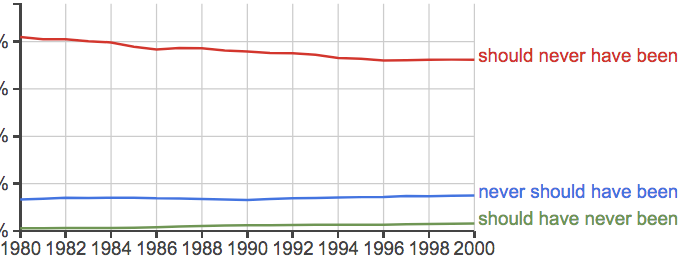"…should have never been there in the first place"
« previous post | next post »
When I read Chris Christie quoted as saying "[I]f Mr. Pruitt is going to go, it’s because he should have never been there in the first place" (e.g. in this article and in this picture caption), the wording "should have never been" struck me as somewhat awkward compared to "should never have been". The third option "never should have been" also seems somewhat better to me. And general usage patterns seem to agree — the COCA corpus has 244 hits for "should never have been" and 125 for "never should have been" vs. 51 for "should have never been", and the Google Ngram viewer shows the same order, with an even larger advantage for "should never have been":
So all three orders are Out There, but "should never have been" is the most common, while Mr. Christie's reported choice "should have never been" is in last place.
In cases like this, however, it's usually a good idea to check what was actually said — and that turns out to be true this time as well. Mr. Christie actually repeats the phrase twice, using two different orders. And both times he reduces should have to shoulda:
| Christie: | and the president's been ill served by this, and if Mr. Pruitt's gonna go, it's because he shoulda never been there in the first place. |
| Interviewer: | Does he have to go? |
| Christie: | Listen, I don't know how you survive this one. And if he has to go- if he has to go, it's he- 'cause he never shoulda been there in the first place. |
For what it's worth, reduction seems to matter in this case — the two versions "he shoulda never been there in the first place" and "he never shoulda been there in the first place" seem just about equally felicitous to me.
And presumably the order "should never have been", though preferred in formal writing, was eliminated by the fact that when Mr. Christie's wave of thought collapsed into determinate lexical particles, the new modal shoulda was a winner, blocking the third possibility.
Here's the ABC News Story, and the video from the ABC Sunday talk show this week: Cheyenne Haslett, "'I don’t know how you survive this one': Chris Christie on Pruitt’s condo deal", ABC News 4/1/2018.

Alyssa said,
April 2, 2018 @ 8:30 am
"should have never been" strikes me as one of those "errors" that's fine in casual speech, but If I wanted to be proper I'd say it as "shouldn't have ever been"
mollymooly said,
April 2, 2018 @ 8:34 am
This Google nGram seems to confirm my hunch that "should have never" is an Americanism
[(myl) Interesting. But maybe it's should have → shoulda that's the underlying process?]
Luke said,
April 2, 2018 @ 9:45 am
"Never shoulda been" feels most natural to me. But I also don't feel that "shoulda" would block the use of "should never have been", for me it would surface as "should nevera been".
Margaret Wilson said,
April 2, 2018 @ 10:42 am
I don't know about Christie's process, but my experience is that this kind of thing is absolutely normal when wrangling a child. I say stuff like this all the time: "You should have been not standing on the counter in the first place!"
I don't think Mark's reduction hypothesis captures this. Instead, it seems like how to describe the misbehavior is still being worked out even as the sentence is in progress. Maybe this is a whole different phenomenon?
cervantes said,
April 2, 2018 @ 11:56 am
"You should have been not standing on the counter" sounds to me to mean "You should have been sitting on the counter."
tangent said,
April 2, 2018 @ 10:23 pm
cervantes sounds like an eight-year-old lawyer to me!
The process I'm familiar with to reach Margaret Wilson's example starts from an overdetermined position: "Why were you standing on a counter awash with soapy vinegar?" "I had to, I didn't have time to clean it up first." "You should have been not" etc.
Eric Wolf said,
April 3, 2018 @ 1:16 am
What's wrong with "never shou'nta been" if we're talking about American English?
Joe said,
April 3, 2018 @ 8:02 am
Google Ngram shows an uptick of "shoulda" usage from the 20s. Perhaps this is a growing acceptability of colloquial constructions in books, but it shows the growing use of this reduction. Other variants such as "woulda" and "coulda" show a similar uptick.
Haamu said,
April 3, 2018 @ 6:11 pm
Christie likes trochaic pentameter, that's all.
Topher Cooper said,
April 3, 2018 @ 6:46 pm
If I'm not over-analyzing, the "should have never been" seems more emphatic to me. Perhaps its that "should have" feels like a strong pronouncement with some moral oomph, rather than just a simple statement about expectations, and the intervening "never" weakens that somewhat. As far as "never should have been", perhaps in Christie's area dialect or idiolect this form puts a stronger emphasis on the negation and that felt right for the repetition to him. I don't feel any of the latter, though, despite having been raised in North Jersey — but then, Newark is almost another state than suburban North Jersey.
loonquawl said,
April 4, 2018 @ 6:35 am
"should have never been" sounds more poetic, and the "been" could work, not as "been [verb]", but stand-alone meaning "should have never existed".
dainichi said,
April 6, 2018 @ 12:22 am
@Alyssa:
>If I wanted to be proper I'd say it as "shouldn't have ever been"
This is interesting in a subtle way. It adds the new dimension of "never" vs. "not ever", but it keeps the adverb in the same place. If I were to use the latter, I'd say "shouldn't ever have been".